- Home
- Patricia Highsmith
A Dog's Ransom Page 19
A Dog's Ransom Read online
Page 19
“Did anyone see you?”
“Leaving your place?” The juke-box—a gravely black voice—was in orgasmic agony at the end of a song. “I don’t think so. I don’t remember seeing anyone. Not the coffee-shop fellow, for instance.”
“And when you got home? Did anybody see you?”
“No.” Clarence felt better because of her concern. “Or rather—I dunno, darling, but I don’t think so.—Honey, the number of enemies that guy must’ve had! Think of that. How many people besides you, for instance, besides Mr. Reynolds, who must’ve hated his guts.”
“Why do you always say ‘Mr. Reynolds’ if you like him so much? Hasn’t he got a first name?”
Clarence smiled. Marylyn sounded suddenly like herself. “His name is Ed. Edward.—Marylyn, I adore you.”
“What’s going to happen to you?”
“Nothing. I’ll bet you nothing.” He reached for her hand that rested on the edge of the table.
She pulled her hand away and gave him a glance of apology. “I can’t stay long.”
Clarence sat back, silent, but he was thinking frantically: she had helped him, after all. Surely she didn’t hate him. “This should blow over in a few days. If they haven’t a clue, they haven’t a clue.” He thought of his gun.
“How did you get home that night? Taxi?”
“I think I walked.”
“You think?”
“I walked.” Clarence swallowed some beer. “I’ll call you in a day or so, darling. I know you’re upset.”
“I’m not upset. I don’t want to see any more pigs. And I’m not sure I should see you again.” She spoke firmly, not as if she were doubtful or even regretful. “I’d better go now.”
“You have to be somewhere?”
“Yes.”
He didn’t believe her. He paid and they walked out. Marylyn seemed to want to go westward on West 4th, the opposite direction of Macdougal.
“Don’t walk me, just leave me here,” she said.
Clarence, pained at leaving her, stopped watching her when she had taken half a dozen steps.
THAT EVENING, MANZONI WAS GOING OFF DUTY when Clarence arrived at the precinct house just before eight. Clarence suspected that Manzoni had lingered in order to see him. Manzoni was leaning against a wall, talking to another patrolman, and he had not yet changed out of uniform.
“Ah, Clarence,” said Manzoni. “How goes it? You heard about Rowinsk, I think.”
“Yes. Sure I did.” The patrolman with Manzoni was a curly-haired Irishman called Pat, who had always been friendly towards Clarence. Pat was smiling now, and Clarence said “Hi” to him. The gun, the gun at the lab was on Clarence’s mind, and he went into the Captain’s office—MacGregor was on duty now—to ask for another gun, or perhaps to hear the result from the lab.
“Ah, Dummell. Clarence,” MacGregor said. “Your gun just got back.” MacGregor had a pleasant expression on his face.
“Thank you, sir.” Clarence’s gun and belt, looking the same as ever, lay on a corner of the Captain’s desk.
“Take it.” MacGregor nodded towards the gun. “What do you think about our friend Rowinsk?”
“I heard about it yesterday.” Clarence picked up his gun and belt. “Homicide was asking me questions. As you see.” Clarence indicated his gun.
“You were in the Village that night.”
“Yes, sir. On Macdougal.”
“Any ideas who did it?”
“No, sir.”
A telephone rang. MacGregor was interested, and took it from the Desk Officer.
Clarence went to the locker room. MacGregor wouldn’t necessarily know, Clarence thought, if the lab had said anything about the gun. Homicide certainly knew where to find him. If they had found blood on the gun, they might simply let him finish his patrol tonight and speak to him later. Manzoni followed Clarence into the locker room, and to Clarence’s annoyance seemed to intend to stand there while Clarence changed.
“Who do you think knocked off the Pole?” Manzoni asked.
“I dunno. Could be a lot of people, I suppose.”
“Who, fr’instance?”
Clarence hung his trousers. Around them, ten or fifteen men were dressing or undressing, talking, paying no attention to him and Manzoni.
“You’re so often in his neighborhood. Did you get fed up and clobber him, Clarence?”
Clarence tried to smile as he stuffed the blue shirt into his trousers. “Aren’t you even closer on Jane Street?”
“I heard you spent the night with your girlfriend. All right. But did you take a walk?”
Clarence glanced in the little mirror on his door as he tied his tie. “Listen, Pete, stop meddling with me. You want to make the Homicide Squad? Go after Rowajinski’s killer. Down in the Village. Not me, chum.”
“Could you take a lie detector test?”
Clarence buttoned his tunic. “Any time.” At least he didn’t feel ruffled just then. Maybe his pulse was a bit faster, but it was from annoyance with Manzoni. There was a difference.
Clarence walked in for the briefing. His patrol partner that night was a fellow younger than Clarence named Nolan. Nolan didn’t mention the Rowajinski affair. He talked about a forthcoming prize fight. He had a bet on it. Clarence’s ring number was 45, and when he called in at 11:45, there was a message for him. Detective Morrissey of Homicide wanted to see him tomorrow morning, and would he be at his apartment?
“Yes,” Clarence said.
Morrissey would be there between eleven and twelve.
When Clarence went off duty at 4 a.m., Captain Smith was at the desk. Nothing was said to Clarence about any message from the lab, so Clarence didn’t know what to believe about his gun.
CLARENCE’S MOTHER TELEPHONED the next morning at eleven. “I hope I haven’t waked you, Clary . . . A policeman was here to see us yesterday. In the evening, because they wanted to see Ralph, too. What’s it all about? This man with the Polish name. He was murdered and you knew him?”
“Well, I didn’t know him. I arrested him. He kidnapped a man’s dog. Mother, he’s a—”
“You never mentioned it.”
“I didn’t think it was very important.”
“The detective said you disliked him. He led us to think it was personal. Said the man had been annoying Marylyn.”
“That’s true. He annoyed other people, too.” Clarence, still in bed, had raised himself on one elbow.
“You had nothing to do with his killing, did you, Clary? The man said you spent the night at Marylyn’s—Tuesday.” Her voice was tense.
Clarence felt a sudden impatience, embarrassment. “That’s true but—”
“Who do you think killed him?”
“I don’t know!”
“Well—what’re they doing to you, Clary? And why?”
“Nothing, Mother. Naturally they question a lot of people. What was the detective’s name?”
“Morrissey. He left his card with us.”
His mother made him promise to telephone her tonight before he went on duty, whether anything had happened or not.
Clarence got out of bed at once and made coffee. Naturally they had put questions to his parents. Had their son seemed upset on Wednesday when he visited them? What had he ever said about Rowajinski? Nothing. Nothing at all. But Clarence hated the lying, especially to his parents. The enormity of what he had done, in their eyes, he could not begin to estimate.
MORRISSEY ARRIVED JUST BEFORE NOON. He was a husky, brown-haired fellow, barely thirty, with a smiling manner and huge hands that could probably knock a man out with a backhand blow.
“Have a seat,” Clarence said.
Morrissey removed his topcoat and sat down. He had his pen and notebook ready. “Well, you know what th
is is about, because Detective Fenucci talked with you, I understand.”
“Yes.”
“We’re trying to find the man who killed Kenneth Rowajinski Tuesday night. And it seems you knew Rowajinski.” Morrissey looked pleasantly at Clarence.
Clarence sat down on the foot of his bed. “I suppose you heard about the kidnapped dog, Edward Reynolds’s dog. That’s how I met Rowajinski.”
“Oh, yes, I saw the Reynoldses—Wednesday night it was. Now, number one, where were you Tuesday night?”
“I was staying with my girlfriend on Macdougal Street. Marylyn Coomes.”
“Yes.” Morrissey glanced as his notes. “What time did you arrive there?”
“About ten.”
“Did you see Rowajinski on the street then? How’d you get to your girlfriend’s?”
“The subway. No, I didn’t see him. I wasn’t looking for him.”
“Rowajinski could’ve been killed before nine p.m. Just before. It’s possible. Where were you before you went to Macdougal?”
“Home. Here. Marylyn wasn’t in before nine-thirty or so. I was calling her from here till I knew she was in.”
“Did you go out during the evening?”
“No, we stayed in.”
“Then what?”
“Then I slept there.”
“And then? What time did you leave?”
Repetition. To see if he gave the same answers. “Around eight, I think.”
Morrissey’s brows went up. “Your girlfriend says around ten. I have it here.”
“It was earlier. She didn’t completely wake up when I left. She’s a late sleeper.”
“You expect to marry Miss Coomes?”
“I hope so,” Clarence replied, in as pleasant a manner as Morrissey had asked the question.
“The time you went to Rowajinski’s house on Morton Street—Why did you go there?”
“Because—Rowajinski said something to my friend, Miss Coomes. He was loitering in her street. He said something unpleasant—”
“What?”
“Something vulgar, I don’t know exactly.—Then he wrote a letter to her. But that was afterwards.”
“After what?”
“After I went to see him. I went to see him after Marylyn told me he’d followed her up the front steps of her house and said something nasty. I thought a good scare would stop him. I didn’t hurt him. I just wanted to scare him.”
Morrissey was waiting for him to continue. “And did it stop him?”
Clarence shifted on the foot of his bed. “Not exactly. The letter came after I saw him. The date’s on the letter, you can see it. It’s at Bellevue.” Clarence had dated the letter Friday, 30th Oct., in the manner of Edward Reynolds’s dating his letters from the Pole.
“Who sent it to Bellevue?”
“Marylyn Coomes showed it to me. I took it to Bellevue.” Clarence didn’t want to go into more detail, and didn’t think he had to.
“Another thing, Rowajinski accused you of taking five hundred dollars to let him go.”
Clarence explained about Rowajinski’s escaping while he went to ask for Edward Reynolds’s agreement to the second thousand of ransom money, and Clarence called it a mistake on his part. “I was searched—my bank account was looked into, I’m sure. I didn’t take that money.”
Morrissey nodded. “But it must’ve been annoying to you to be accused.”
Clarence shrugged. “By that nut? Rowajinski liked to annoy people. That’s all he did.” Clarence smiled and took a cigarette.
Morrissey asked Clarence about his career so far in the police force. It was a brief story: a year’s service, and nothing very interesting had happened to him in that time. Clarence thought Morrissey had very likely already looked into his record.
“You were in the neighborhood that night,” Morrissey said, “just about seven blocks away. And you had plenty of reason to dislike this guy.—You’re telling me the truth in all your answers here?”
“Yes,” Clare said.
Morrissey smiled. “Because I’m sure you’re going to be questioned some more and some of these guys, you know—a little tougher than I am—they’re going to give you a tougher time.”
Tougher than Morrissey, if Morrissey wanted to be tough? “I can’t help that,” Clarence said.
Morrissey nodded, still watching Clarence. “Of course I realize Rowajinski’s landlord didn’t like him and neither did the guy where he bought his groceries, but still.” Morrissey chuckled. “I doubt if they’d up and clobber him the way he was clobbered.” He lit a cigarette. “You’re getting along all right with your girlfriend?”
Clarence wondered if it was Morrissey who had been to see Marylyn, and it bothered Clarence that he didn’t know. “Yes,” Clarence said.
“She told me she didn’t like cops. She didn’t have to tell me that, I could see it. How does she feel about your being a cop?” Morrissey’s innocent, healthy grin was back.
“Oh, I’ve told her I wasn’t going to be a cop forever.”
“You have plans for quitting?”
“Not plans. Just that I don’t expect to stay in the force for twenty years. The way some do.”
“You look down on the force? You don’t like it?”
“Of course I don’t look down on it.” What else is there even trying to hold the fort? Clarence thought. However he knew what Morrissey was thinking, that he wasn’t a typical cop, not one of the brotherhood who stayed in for years and loved it. “I like it all right.”
Morrissey looked from Clarence to his wrist-watch. “About Edward Reynolds—He must’ve hated this guy, too.”
Clarence chose to say nothing. He was standing now, and so was Morrissey, about to leave.
“He wouldn’t’ve paid anybody to knock Rowajinski off, do you think?”
“Absolutely not,” Clarence said.
“You sound as if you’re sure.”
“No, that’s just my opinion.”
Morrissey nodded. “So—I thank you. You’ll be hearing from us.” Smiling, he put on his coat.
He was gone. Not a word about witnesses. Clarence felt easier.
Clarence telephoned Marylyn. She was in. He did not want to tell her that he had just seen Morrissey, even though it had been a fairly successful interview. He said:
“Can you have an early dinner with me tonight before I go on at eight?”
“No, Clare.”
“Why not?—You have to work?”
“I feel a little funny about it.”
She sounded so tense, he wondered if someone was with her, but he didn’t want to ask this. “Funny about me?”
“Yes, in a way.”
It was agony for Clarence not to be able to find, quickly, the right words. He couldn’t say over the telephone such fragile things as, “But you do care about me, don’t you?” Finally he said, “When can I see you? Give me a date, darling.”
“I don’t know. I wish you wouldn’t count on anything.”
“Oh, Marylyn—”
“What’s happening? Anything?”
“Nothing, darling.” In a way, he meant it. He wasn’t worried. “There’s not going to be any trouble.”
But she didn’t want to make any date with him, and she said she would have to work over the weekend.
Clarence went to Columbia and to New York University that afternoon to inquire about courses in business management. NYU was cheaper and closer to his apartment. He could also take two courses in the afternoons at NYU, while at Columbia the courses would be spread into morning and afternoon, sometimes on the same day. His problem was the police schedule. It was difficult to start any courses if he stayed on in the force, because every three weeks his schedule changed. Tonight and tomorrow
were his last nights of the 8 p.m. to 4 a.m. duty, and on Monday, November 9, he changed to noon to 8 p.m. duty. If he quit the force after Christmas, he could start in the January semester. Clarence thought he should do this.
He wanted to try Marylyn again and didn’t dare. Her firmness was devastating to Clarence. It came to him forcefully that what he had done was repellent, shocking to other people. It was shocking to kill a man, pistolwhip him to death, even if the victim was a man who had hurt other people and who deserved worse than the law had given him. To the law, Rowajinski’s life was still a human life. Clarence himself was another human being, not a soldier, and not merely a cop in uniform. No one had ordered him to kill Rowajinski. Clarence’s thoughts were somewhat vague. He felt nervous and melancholic. He twice dropped his gun Friday and the gun made an awful clatter on the floor. The girl who lived in the apartment below him, a good-looking model who kept odd hours, said when they met in the hall:
“Are you practicing karate up there and flinging yourself to the floor?”
Clarence smiled, embarrassed. “I dropped something.”
“Not your gun, I hope.”
“I’m afraid you guessed it.”
“Hang on to that gun. New York is counting on you.”
ON SATURDAY MORNING, Clarence awakened groggy after a series of unpleasant dreams. In one of the dreams he had been a cripple, more crippled than Rowajinski, scorned and avoided by other people. Clarence realized that he wanted to tell Edward Reynolds about Rowajinski. Mr. Reynolds would not despise him for it, Clarence thought. Mr. Reynolds would understand.
It was 10:20 a.m., and both the Reynoldses might be at home. When Clarence dialed their number, a recorded voice said that the number had been changed. Clarence took the new number down, dialed it, and Mr. Reynolds answered.
“Hello. This is Clarence Duhamell. You’ve moved?”
“Yes,” said Ed cheerily. “We’re on East Ninth.”
“I’d like very much to see you—today if possible. Have you any time? Fifteen minutes or so?”
“We’re going out to lunch. How is three o’clock?”
“That’s fine. Can I meet you out somewhere? If you’re on East Ninth, there’s the Fifth Avenue Hotel—”

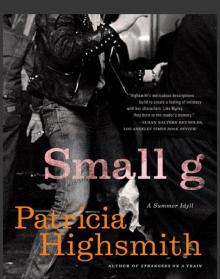 Small G: A Summer Idyll
Small G: A Summer Idyll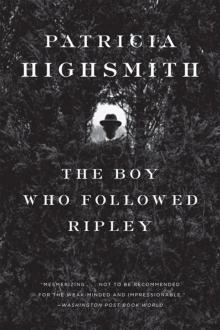 The Boy Who Followed Ripley
The Boy Who Followed Ripley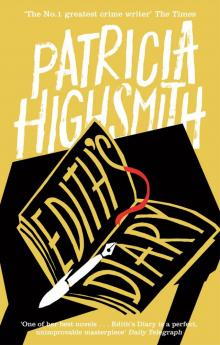 Edith's Diary
Edith's Diary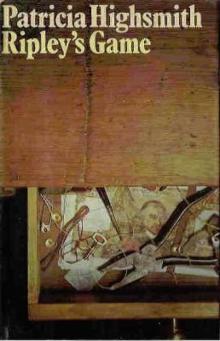 Ripley's Game
Ripley's Game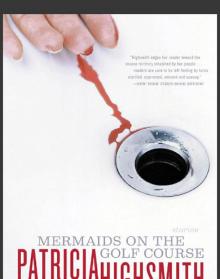 Mermaids on the Golf Course: Stories
Mermaids on the Golf Course: Stories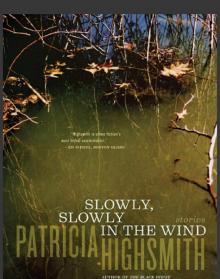 Slowly, Slowly in the Wind
Slowly, Slowly in the Wind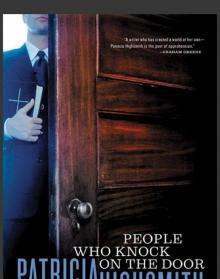 People Who Knock on the Door
People Who Knock on the Door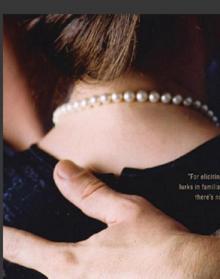 The Glass Cell
The Glass Cell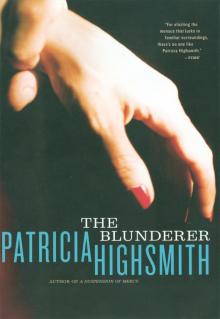 The Blunderer
The Blunderer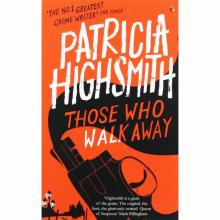 Those Who Walk Away
Those Who Walk Away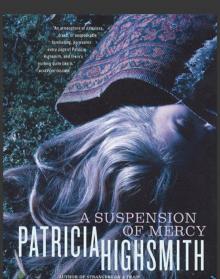 A Suspension of Mercy
A Suspension of Mercy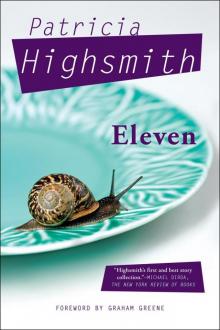 Eleven
Eleven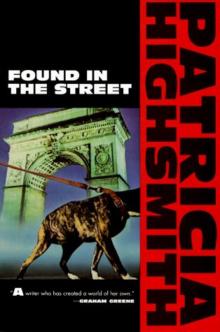 Found in the Street
Found in the Street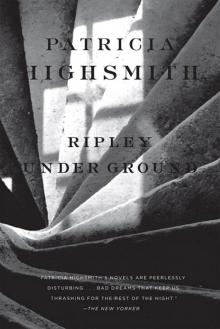 Ripley Under Ground
Ripley Under Ground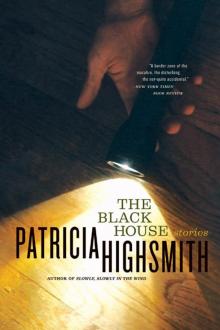 The Black House
The Black House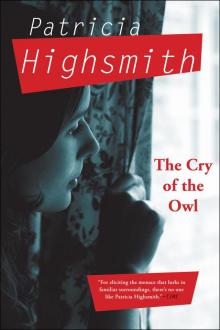 The Cry of the Owl
The Cry of the Owl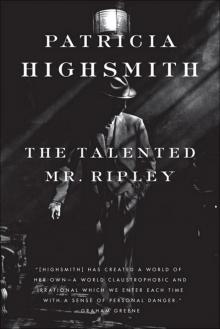 The Talented Mr. Ripley
The Talented Mr. Ripley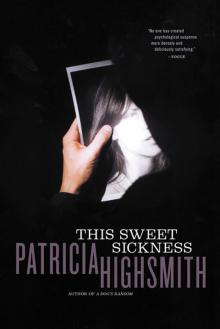 This Sweet Sickness
This Sweet Sickness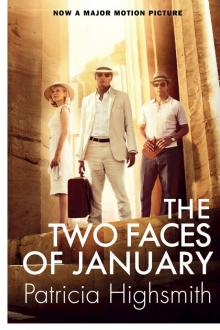 The Two Faces of January
The Two Faces of January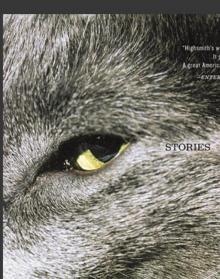 The Animal-Lover's Book of Beastly Murder
The Animal-Lover's Book of Beastly Murder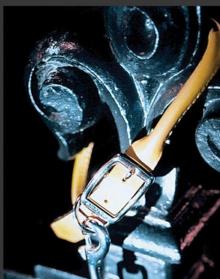 A Dog's Ransom
A Dog's Ransom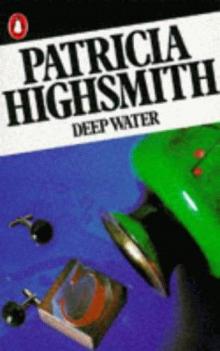 Deep Water
Deep Water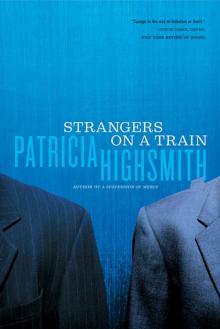 Strangers on a Train
Strangers on a Train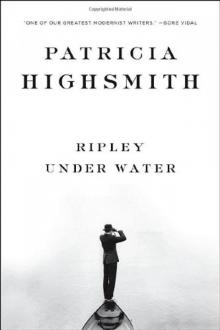 Ripley Under Water
Ripley Under Water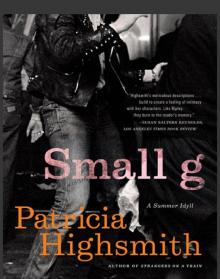 Small g
Small g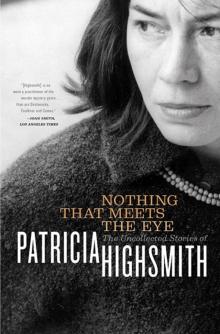 Nothing That Meets the Eye
Nothing That Meets the Eye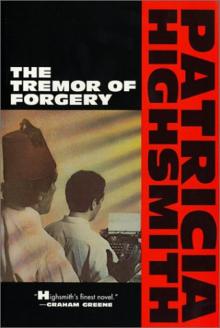 Patricia Highsmith - The Tremor of Forgery
Patricia Highsmith - The Tremor of Forgery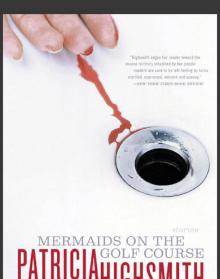 Mermaids on the Golf Course
Mermaids on the Golf Course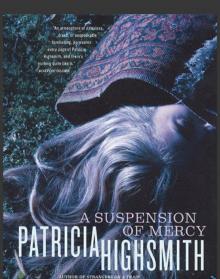 Suspension of Mercy
Suspension of Mercy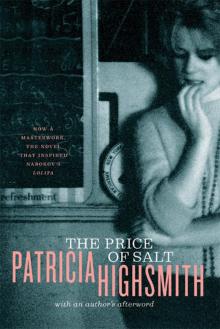 The Price of Salt, or Carol
The Price of Salt, or Carol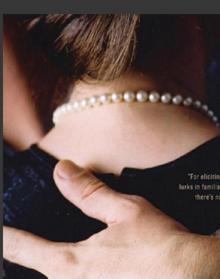 Glass Cell
Glass Cell